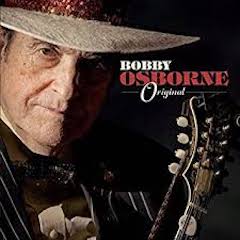
Bobby Osborne: Look sharp, be sharp

ORIGINAL
Bobby Osborne
Compass Records
Back in 2013, while producing Peter Rowan’s acclaimed The Old School album (reviewed here in Deep Roots and also coming in at #47 on the 2013 Elite Half-Hundred), Compass Records founder/banjo virtuoso Alison Brown heard then-81-year-old bluegrass giant Bobby Osborne comment on how he was unlikely ever to record another solo album. Having seen in the sessions how much more Bobby had to give musically, Ms. Brown made a priority of proving him wrong on that point. The result, Original, is a triumph of the first order.
Let’s face it: put a group of accompanying musicians together as fearsomely gifted as those Ms. Brown assembled for the Osborne sessions and even yours truly, barely competent on guitar and monumentally challenged when it comes to singing on-key, might well deliver an agreeable long-player. What’s happened on Original is a transformation of seemingly casual sounding sessions into something nigh on to transcendent simply by dint of the emotional commitment evident in every note sung and played. The album kicks off with a gripping interpretation of Lerner & Loewe’s “They Call the Wind Maria,” the duo’s signature song from their 1951 Broadway musical Paint Your Wagon. (Fun fact: Author George Rippey Stewart, in his 1941 novel titled Storm, referred to the titular event as “Maria”; in turn, the success of Stewart’s novel inspired WWII-era U.S. military meteorologists to give storms female names, and you know the rest.) Bluegrass artists are fond of opening with high-energy workouts but the haunting nature of “They Call the Wind Maria,” evocatively summoned by Osborne’s plaintive high tenor and the soaring harmony vocals courtesy Jim Lauderdale and David Mayfield, is intensified further by the breathtaking intensity fueling the conversation between mandolin (Sierra Hull), banjo (Ms. Browne) and the blazing fiddle (Stuart Duncan). It heralds something exceptional about to unfold, and what follows does not disappoint. The musical arc encompasses affecting tunes from not only great such as Lerner & Loewe but other titans such as Webb Pierce, Mel Tillis, Darrell Scott, Hank Cochran—even the Brothers Gibb and Otis Blackwell, and it all winds down to a beautiful finale in the form of an aching, harmony-rich take on Webb Pierce’s 1960 heartbreaker, “Pathway of Teardrops,” which happened to become an Osborne Brothers classic along the way too. Its tear-stained message outlining terms of reconciliation with a wayward love is, like that of “They Call the Wind Maria,” augmented by the voices seconding Bobby’s piercing tenor (one of the most distinctive and moving in bluegrass history), especially those of twin fiddlers David Crowe and Buddy Griffin; Wynn Osborne’s lonely spare banjo; and the emotional harmony vocals supplied by bassist Bobby Osborne, Jr. and guitarist Joe Miller—Bobby himself also contributes a concise, tasty mandolin solo along the way.
‘I’ve Gotta Get a Message to You,’ the Bee Gees’ 1968 hit reimagined bluegrass-style by Bobby Osborne on his new album, Original, produced by Alison Brown. Bobby on lead vocal and mandolin; Sierra Hull (mandolin); Trey Hensley (guitar); Stuart Duncan (fiddle); Claire Lynch (harmony vocal); Todd Phillips (bass); Alison Brown (banjo).
Sierra Hull discusses working with Bobby Osborne on Original
All in all, it’s quite a journey. Mel Tillis’s “Goodbye Wheeling,” a 1979 song marked by the Stuttering Lad’s clever wordplay (“I’ve been wheeling, around Wheeling, West Virginia…gotta be leavin’ because one deceivin’ freewheeling woman done me wrong…”) interpolates a snippet of John Denver’s “Take Me Home, Country Roads” melody (on the words “West Virginia”) and is curiously upbeat for being a man’s farewell to his faithless paramour, although the music does have a darker shade to it, thanks to the sensitivities of another all-star assemblage of players including Josh Williams (guitar), Robbie McCoury (banjo), Bryan McDowell (fiddle), Ronnie McCoury (mandolin), Missy Raines (bass), with Bobby on twin mandolin and Del McCoury adding memorable, high lonesome harmony to the choruses. Buddy Spicher and Matt Combs are responsible for the striking use of strings—evoking both classic western swing of the Bob Wills variety and the ‘60s Nashville Sound–opening and shadowing Bobby’s straightforward reading of Hank Cochran’s “Make the World Go Away.” As a denouement Arthur Hancock’s “Country Boy,” a gentle, mountain-flavored reminiscence of carefree childhood days, reveals a delicate, neo-Renaissance quality, thanks in large part to the beautiful, harpsichord-like solo Sierra Hull fashions on mandolin before Stuart Duncan returns it to the backwoods with the long, lean lines of his fiddle solo as Ms. Browne adds a delicate undercurrent on banjo.
‘Kentucky Morning,’ written by Darrell Scott and making it recorded debut on Bobby Osborne’s Original. Backing Bobby’s lead vocal are Sierra Hull (mandolin); Trey Hensley (guitar); Rob Ickes (dobro); Stuart Duncan (fiddle); Todd Phillips (bass); Dale Ann Bradley and Darrell Scott on harmony vocals.
In the category of special treats, witness Darrell Scott’s heart tugging story-song “Kentucky Morning,” here making its debut on record. The singer recounts how he stayed behind in Kentucky while “the others” were migrating to “the mills of Chicago, to the plants of Detroit/for the promise of a five-dollar day.” Finally giving in to his brother’s summons north, he is quickly alienated by life on the assembly line, and goes home—to Kentucky, having learned to look no further than his own back yard when he goes seeking his heart’s content. Over a rich, noir-ish soundscape supplied by Ms. Hull’s mandolin, Duncan’s fiddle, Rob Ickes’s emotional dobro and Trey Hensely’s guitar, with Dale Ann Bradley and Darrell Scott himself on harmony vocals, our man Bobby pours his heart into a chorus he clearly feels to his core, to wit: “Oh your bright lights don’t shine/like a Kentucky morning/You can’t hear a whippoorwill out on the street/give me a good piece of land and an old cane-backed rocker/while life goes on…and on/while life goes on and on…” after which Ickes enters with a soulful dobro solo guaranteed to hit you where you live if you have precious memories of the comforts of home and hearth.
SELECTED TRACK: ‘Pathway of Teardrops,’ Webb Pierce’s 1960 hit, also an Osborne Brothers classic, as featured on Bobby Osborne’s Original. With Bobby on lead vocal and mandolin, the band includes Joe Miller (guitar, harmony vocal); David Crowe and Buddy Griffin (fiddles); Wynn Osborne (banjo); Bobby Osborne, Jr. (bass and harmony vocal); Robby Osborne (drums).
If you’re at all familiar with the pre-disco Bee Gees’ 1968 Top 10 single “I’ve Gotta Get a Message to You,” then be prepared to hear it with new ears when Bobby, in tow with Ickes, Hull, Hensley, Duncan, Browne, Phillips, with Bryan McDowell and the incomparable Claire Lynch on harmony vocals, reimagines it as a strutting bluegrass outing supplanting the original’s anguished existential urgency with a desperate plea more cognizant of time running out. In this context the cool bluegrass swing given “Don’t Be Cruel” renders the tune as something of a backstory to “I’ve Gotta Get a Message to You,” before the anxiety set in. Osborne sings with carefree authority, and the backing trio of Sam Bush (mandolin), Jim Hurst (guitar) and Todd Phillips (bass) do a mighty fine take on the Jordanaires’ trademark harmonies in what is one of the album’s most winning moments.
SELECTED TRACK: ‘They Call the Wind Maria,’ written by Lerner & Loewe for the 1951 Broadway musical, Paint Your Wagon. Supporting Bobby’s lead vocal on Original’s opening track are Sierra Hull (mandolin); Trey Hensley (guitar); Stuart Duncan (fiddle); Alison Brown (banjo); Todd Phillips (bass); Jim Lauderdale and David Mayfield (harmony vocals).
Bobby Osborne, now 85 years old, sounds decades younger than his years. The same could be said of Chuck Berry on his new album, Chuck, although he didn’t live to witness its justified critical acclaim. Certainly Chuck could have laid claim to the Original title and no one would have disputed him. In Bobby’s case, the title fits on multiple levels: the Osborne Brothers were a direct link from traditional to progressive bluegrass, and Bobby’s tenor was a distinctive instrument of considerable influence on succeeding generations of bluegrass and country vocalists; and though the songs here are not Osborne originals, he and the musicians under the guidance of Alison Browne have retained each song’s essence while tailoring the whole to the Osborne sensibility. Everything old is new again, and Mr. Osborne, sui generis, stands out as being wholly original. It’s a title well earned.


